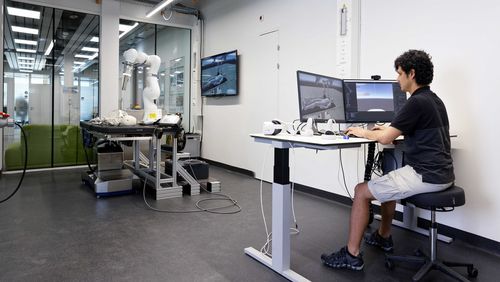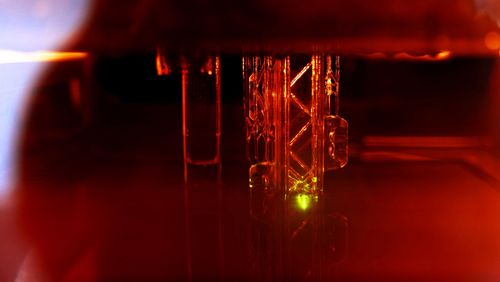
Smart implants
In future, intelligent implants will be able to directly monitor how well a broken leg is healing. And if necessary, the implants will set off targeted movements to actively stimulate healing at the site of a break. A research team at Saarland University Medical Center is working to realise this vision.
Gentle stimulation promotes healing in bone fractures. This basic principle has inspired a research team at Saarland University Medical Center to develop an intelligent implant that will automatically perform physiotherapy exercises night and day – with no further action required by either doctor or patient.
Until now, doctors have generally used standard implants to heal bone fractures: plates that are screwed into the bone for stabilisation. However, the bones don’t always knit properly, with complications arising in more than one in ten fractures of the lower leg. Patients are also often in pain, and follow-up treatments are necessary.
Now, an interdisciplinary team at Saarland University Medical Center are developing intelligent implants that promise to improve and speed up healing. In addition to stabilising the broken bone, a smart implant will provide information on how well the fracture is healing while also detecting incorrect weight bearing. If a break isn’t healing well, the implant will react.
For instance, if too much pressure or weight is placed on a fracture, the implant will stiffen, relieving strain on the bone. By contrast, if a patient is too sedentary, the implant will change its shape and become more flexible, thus increasing pressure on the bone. All processes are monitored by an external device such as a computer or a smartphone. After healing is complete, the implant is removed. Werner Siemens Foundation Endowed Chair Bergita Ganse, who is responsible for coordinating the research team, is aiming to have completed the first prototype of the smart implant by 2025.
Facts and figures
Project
The team at the Saarland University Medical Center develop intelligent implants using novel technologies from materials science. The aim is to improve the treatment of complex bone fractures by monitoring and autonomously steering the healing process.
Support
The Werner Siemens Foundation is funding the planning stage, materials research and development of a prototype implant as well as animal testing in the validation phase.
Funding from the Werner Siemens Foundation
8 million euros over 6 years
Project duration
2019 to 2025
Project leadership
PD Dr Marcel Orth, Prof. Tim Pohlemann, Prof. Tina Histing, Dr Mika Rollmann, Dr Johannes Braun, Department of Trauma, Hand and Reconstructive Surgery, Saarland University Medical Center, Germany
Project partners
Prof. Stefan Diebels, Dr Michael Roland, Professorship for Engineering Mechanics, Saarland University, Germany
Prof. Stefan Seelecke, Dr Paul Motzki, Center for Mechatronics and
Automation Technology (ZeMA), Saarbrücken, Germany
Prof. Philipp Slusalleck, Dr Tim Dahmen, German Research Center for Artificial Intelligence (DFKI), Saarbrücken, Germany





